I saw a lot of posts about HDD password on the Internet, but after reading them, I had a vague idea of the HDD password. Well, if you also have such doubts, it doesn't matter, I am willing to take you to deeply understand about HDD password, including six questions.
There are six issues to take you to deeply understand about HDD password are as follow:
HDD password is divided into user password and master password. At the same time, encryption levels are classified into advanced and the most advanced of these two. The master password can remove the user password, the general hard disk has a universal master password. If you add the user advanced password, do not power off, the hard disk is not locked, you can directly re-encrypt the password. If the power is off, the hard disk is locked, and the data area is refused to read and write, but firmware areas can still be operated, such as modifying capacity, reading FW and so on.
Step 1: Go to the BIOS settings while start or restart your computer.
Step 2: Press the right arrow key to locate to Security tab, find out Password option to enter.
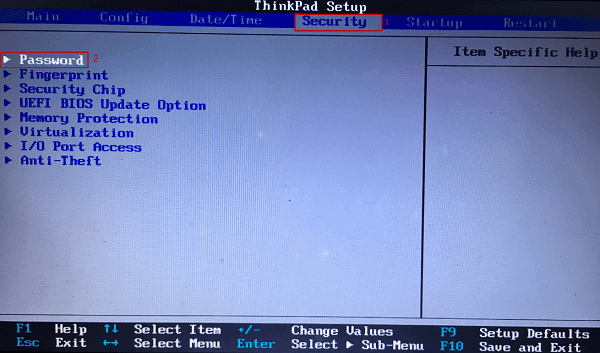
Step 3: In Password window, press the down arrow key to navigate to Hard disk password. Hit Enter key to pop up Setup Confirmation dialog and select User + Master.
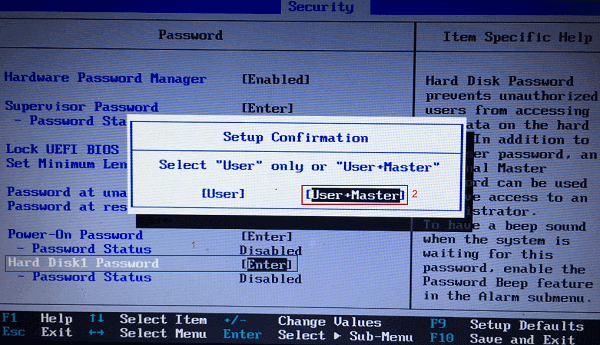
Step 4: Click Continue to set User Hard Disk Password first.
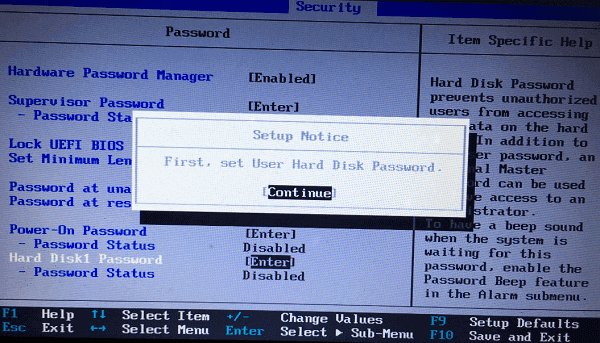
Step 5: Enter new password and confirm it.
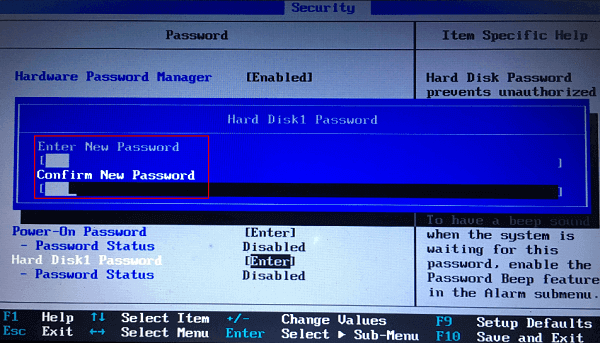
Step 6: Then, similarly click Continue to set Master Hard Disk Password.
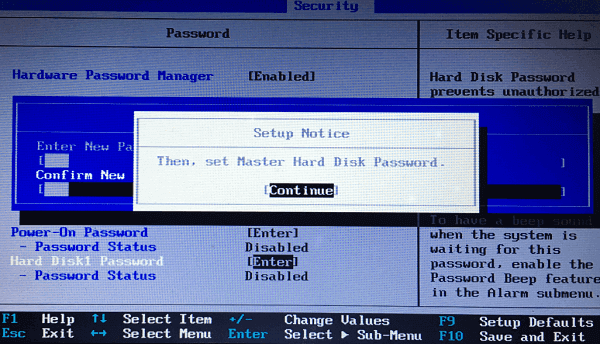
Step 7: Input new password for twice to set the master password.
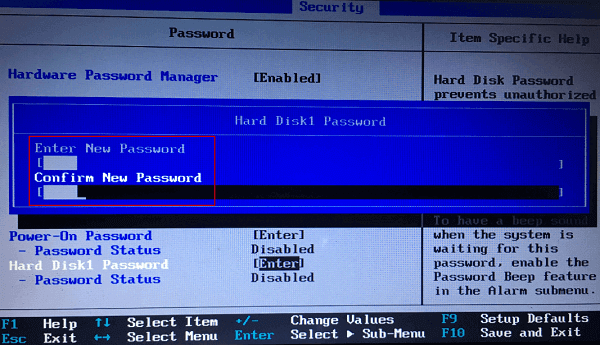
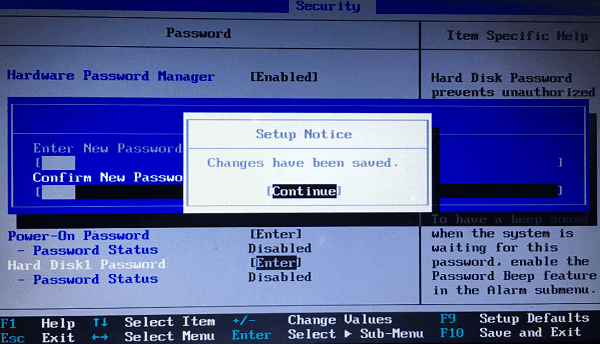
Step 8: When finished setting the user and master password, press F10 key to save configuration changes and exit and then your computer will restart itself. At this time, the motherboard will ask for a user password, you just input the password you have set.
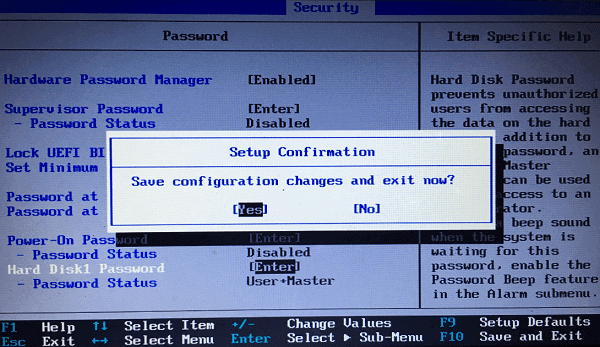
Attention: The motherboard prompts for a hard disk password after restarted. This is not something you can do by taking out the motherboard battery for discharging or clearing password jumper. Because the HDD password is not in the motherboard at all, it follows the hard disk, even if you take it down and connect it to another machine, and the target computer's BIOS/UEFI does not support HDD password feature, without the hard disk, the hard disk does not work directly.
Tips: By the way, the hdparm tool of Linux can also operate and unlock the HDD password on hard disk even if the motherboard does not support HDD password, but you need to know the HDD password. I have measured to send an unlocked instruction (require hard disk password) for the hard disk via hdparm. Then use hdparm to let hard disk reread the hard disk partition table, you would find that hard disk works normally without the support of motherboard BIOS/UEFI. It is precisely explained that this encryption is the matter of hard disk internal hardware, the motherboard only sends the unlocking instruction to the hard disk.
The user password is set by the user himself. After setting the user password, it will automatically enter locking mode after the hard disk is powered on next time.
The master password can be set by the manufacturer or seller or administrator via SSP(F1H) command, and the master password does not need to be locked.
I saw several brands of SSD drive, such as Intel, TOSHIBA and SanDisk, but except Intel obviously supported "hardware encrypted AES 256 bits", other brands did not find this feature, but I could also set the password when testing hard drive. So, I understand that some hard drives encrypt the data after setting the password and store it on the hard disk. Some hard drives do not encrypt the data after setting the password, the password is just a password to access the data on the hard disk. Even if there is no encrypted data to store, it is not easy to crack the password.
I made several tests according to this video, but they all failed. I also tried to use other software to reset or restore hard disk password, but none of them succeeded. For now, HDD password is much more secure than the Windows password.
Here comes a question: Does the HDD build in encryption reduce Disk read/write performance? So what I'm going to do now is to test if it has an impact, and if so, how much? Please take a closer look at the following two tests:
Test 1
Tools: Thinkpad T420 + TOSHIBA SSD Q200EX + CrystalDiskMark;
Condition: Encryption or no encryption;
Test result: Disk read/write performance;
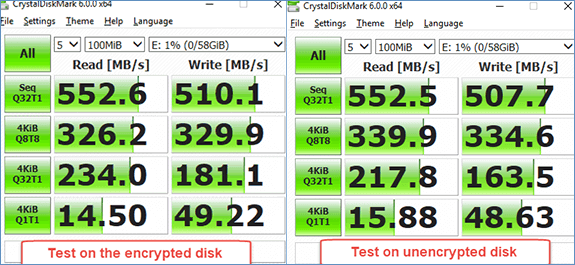
Test 2
Tools: Thinkpad T420 + HITACHI HDD 7k500-500 + CrystalDiskMark;
Condition: Encrypt or no encrypt;
Test objective: Disk read/write performance;
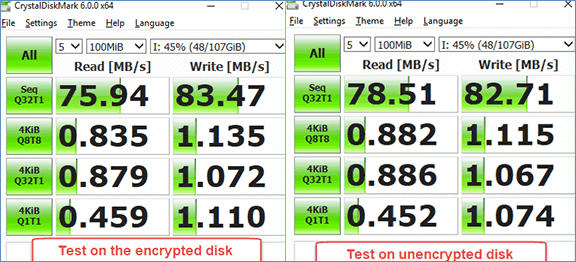
Summary
From the data obtained from the above two tests, there is no obvious gap of Disk read/write performance between encryption and no encryption, so it turns out that HDD password does not reduce Disk read/write performance.